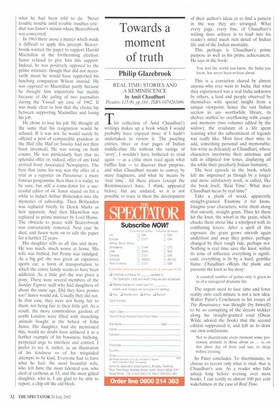Towards a moment of truth
Philip Glazebrook
REAL TIME: STORIES AND A REMINISCENCE by Amit Chaudhuri Picador, £15.99, pp.I84 , ISBN 0374281696 This collection of Amit Chaudhuri's writings makes up a book which I would probably have enjoyed more if I hadn't undertaken to review it. The puzzling entries, three or four pages of Indian middle-class life without the vestige of 'story', I wouldn't have bothered to read again — as a critic must read again what baffles him — to discover their purpose, and what Chaudhuri means to convey by mere fragments, and what he means by 'real time'. All these pieces (except the Reminiscence) have, I think, appeared before, but are undated, so it is not possible to trace in them the development of their author's ideas or to find a pattern in the way they are arranged. What every page, every line, of Chaudhuri's writing does achieve is to load into his reader's mind much rich detail of Indian life and of the Indian mentality.
This perhaps is Chaudhuri's prime purpose as well as his prime achievement. He says in the book:
You feel the world you know, the India you know, has never been written about
This is a conviction shared by almost anyone who ever went to India, that what they experienced was a real India unknown by others, a land and people observed by themselves with special insight from a unique viewpoint; hence the vast Indian section in any worthwhile library, its shelves stuffed to overflowing with essays and memoirs (two volumes edited by the widow); the residuum of a life spent learning what the subcontinent of legends was really like. Most have their mite to add, something personal and memorable; few write as delicately as Chaudhuri, whose characters intertwine their antennae and talk in elliptical low tones, displaying all the while their peculiarly Indian humanity.
The best episode in the book, which left me impressed as though by a longer and more satisfactory work, is called, like the book itself, 'Real Time'. What does Chaudhuri mean by real time?
Take a plank of wood, apparently straight-grained. Examine it for knots. Imagine your characters; write them along that smooth, straight grain. Then let them hit the knot, the whorl in the grain, which chucks them about like a whirlpool with its conflicting forces. After a spell of this exposure the grain grows smooth again underfoot and away they potter, perhaps changed by their rough ride, perhaps not. Nothing is real time save the knot; within its zone of influence everything is significant, everything is lit by a hard, gemlike flame. Chaudhuri offcuts the plank and presents the knot as his story: A counted number of pulses only is given to us of a variegated dramatic life.
The urgent need to face time and force reality onto each minute is not a new idea. Walter Pater's Conclusion to his essays of The Renaissance was thought (by himself) to be so corrupting of the decent trekker along his straight-grained road (Oscar Wilde adored the book) that the second edition suppressed it, and left us to draw our own conclusions.
Not to discriminate every moment some passionate attitude in those about us ... is, on this short day of frost and sun, to sleep before evening.
So Pater concludes. To discriminate, to choose to record only what is vital: that is Chaudhuri's aim. As a reader who falls asleep long before evening over most books, I can testify to almost 100 per cent wakefulness in the case of Real Time.


























































 Previous page
Previous page